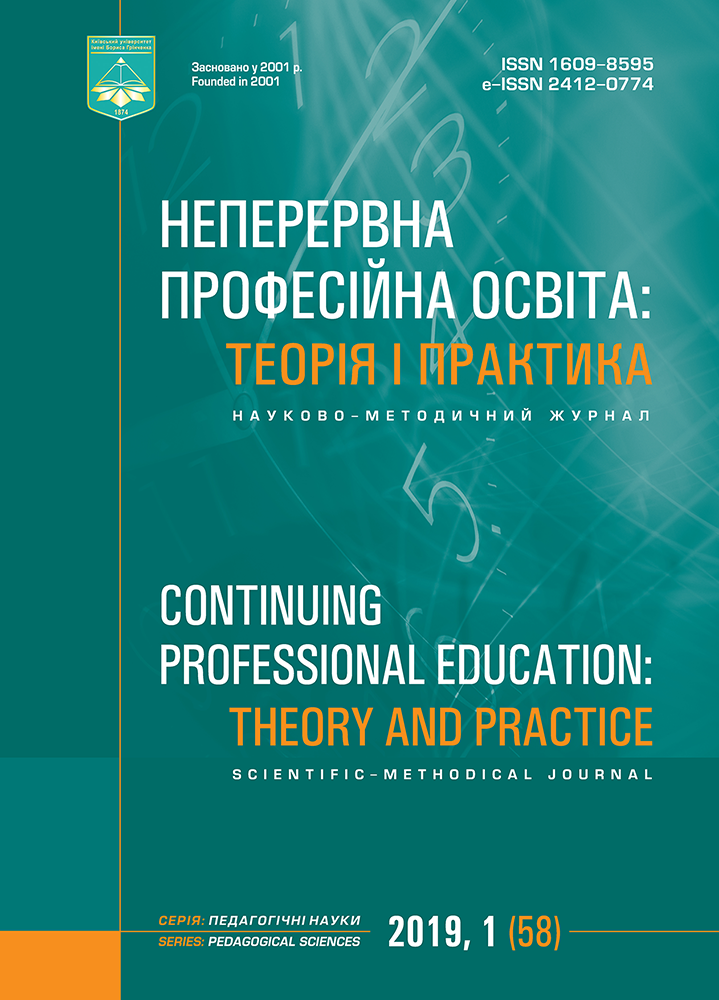LIFELONG LEARNING: MUSIC ADULT EDUCATION
DOI:
https://doi.org/10.28925/1609-8595.2019.1.1722Keywords:
adults’ education, lifelong education, musical andragogy, musical studies.Abstract
During the last decades in the modern society becomes more popular the idea of lifelong education which means the possibility of adults to join the educational environments for further professional development. In the current article we disclose the essence of the lifelong education in common and in the field of artistic education. In addition, we specify the adulthood age-peculiarities according to the educational expectations and define the role of educator (teacher, tutor) in the context of musical studies for adults. The contemporary educational system is characterized by the openness and availability. It is represented through the threefold structure which includes formal, non-formal and informal education. These types of lifelong education provide the opportunity to practice music for all who want to achieve their skills and get new knowledge. Among the adult audience the most popular forms of musical lifelong education are both formal and non-formal. Some adults begin to practice music for their work and some people choose music as a hobby. But all of these students have the same goals – to realize their self-development ambitions and improve themselves. According to these goals students could choose the place where to get the music education: at musical colleges, universities, academies, musical schools, studious or courses, at the private lessons with a teacher or with online coacher etc. In consequence of musical studies, the student can develop his/her music and performing competence. It provides formation of students’ skills, knowledge and experience of musical activities. They learn how to do the everyday routines and prepare the interpretation of music pieces, how to organize and follow the self-guided work. In addition, during the musical classes students develop their aesthetic tastes and artistic tolerance, learning how to think about the artistic ideas in music pieces and how to build the interpretation plan according to composer’s view. Following the basic frameworks of andragogy (the science about adults’ education) the author highlights that music studies cannot be limited by the age of students. Contrary, the educational process obtains the new characteristics and qualities depend on who is a student – an adult or a child. But the author notices that teacher (tutor, educator) is a very important figure in the educational chain both with children and adults.References
Vasilkova, T. A. (2009). Osnovy andragogiki [The fundamentals of andragogy]. Moscow, Russia: KNORUS (rus).
Horbenko, O. B. (2015). Formuvannya vykonavskoyi kompetentnosti maybutnoho vchytelya muzychnoho mystetstva [Formation of music and performing competence of future music teacher]. ScienceRise. Pedagogical Education, 10 (5), 40–43. DOI: https://doi.org/10.15587/2313-8416.2015.51968 (ukr).
Hordiyenko, M. H. (2012). Psykholohichnyy aspekt vyznachennya doroslosti [Psychological aspects of definition of Adulthood]. Naukovi zapysky Nizhynskoho derzhavnoho universytetu im. Mykoly Hoholya, Psykholoho-pedahohichni nauky, 2, 11–14 (ukr).
Dzyuba, T. M., Kovalenko, O. H. (2013). Psykholohiya doroslosti z osnovamy herontopsykholohiyi [Psychology of Adulthood with fundamentals of gerontology]. Poltava, Ukraine: PNPU (ukr).
Lukyanova, L. B., Anishchenko, O. V. (2014). Osvita doroslykh: korotkyy terminolohichnyy slovnyk [Adult education: the short terminology dictionary]. Nizhyn, Ukraine: Lysenko M. M. (ukr).
Martynets, L. A. (2015). Osvita doroslykh: formy ta zmist [Adult education: forms and essence]. Osvita ta rozvytok obdarovanoyi osobystosti, 6, 14–17 (ukr).
Marufenko, O. V. (2013). Tendentsiyi rozvytku systemy neperervnoyi osvity v XXI stolitti [Tendencies of lifelong education in the XXI century]. Aktualni pytannya mystetskoyi osvity ta vykhovannya, 1, 53–62 (ukr).
Oleksyuk, O. M. (2016). Neperervna mystetska osvita u formuvanni dukhovnoho potentsialu osobystosti [Continuing art education in shaping the spiritual potential of the individual]. Naukovi zapysky Kirovohradskoho derzhavnoho pedahohichnoho universytetu imeni Volodymyra Vynnychenka, Pedahohichni nauky, 147, 19–21 (ukr).
Sysoyeva, S. O. (2011). Interaktyvni tekhnolohiyi navchannya doroslykh [The Interactive adult-learning technologies]. Kyiv, Ukraine: EKMO (ukr).
Sihayeva, L. Ye. (2011). Kharakterystyka struktury osvity doroslykh v suchasniy Ukrayini [The Characteristics of Adults’ Education Structure in the Modern Ukraine]. Visnyk Zhytomyrskoho derzhavnoho universytetu imeni Ivana Franka, 59, 38–42 (ukr).
Sobol, N. V. (2016). Khudozhno-tvorcha tolerantnist u konteksti instrumentalno-vykonavs’koyi diyalnosti maybutnikh uchyteliv muzyky [Artistic tolerance within a context of future music teachers’ instrumental performing training]. Muzychne mystetstvo v osvitolohichnomu dyskursi, 1, 29–34 (ukr).
Stashevska, I. O. (2016). Sutnist, struktura i vzayemozvyazky muzychnoyi pedahohiky yak naukovoyi systemy ta muzychno-osvitnoyi praktyky [Essence, structure and interrelations of musical pedagogics as scientific system and musical and educational practice]. Osvita ta pedahohichna nauka, 1, 13–23 (ukr).
Smith, M. K. (2002). Malcolm Knowles, informal adult education, self-direction and andragogy. The encyclopedia of informal education. Retrieved from www.infed.org/thinkers/et-knowl.htm (eng).
Downloads
How to Cite
Issue
Section
License
Copyright (c) 2020 Nataliia Sobol

This work is licensed under a Creative Commons Attribution-NonCommercial 3.0 Unported License.



